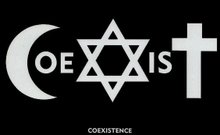 This is an article from Sojourners, written by Editor and Chief Jim Wallis, about the values Christians hold dear and fight for in the political and social realms. Wallis puts forth a wonderfully constructive vision for how the Body of Christ needs to operate TOGETHER to live out God's Kingdom here on earth...even amidst the messy business of politics.
This is an article from Sojourners, written by Editor and Chief Jim Wallis, about the values Christians hold dear and fight for in the political and social realms. Wallis puts forth a wonderfully constructive vision for how the Body of Christ needs to operate TOGETHER to live out God's Kingdom here on earth...even amidst the messy business of politics.
I'm grateful to Tony Perkins and FRC Action for hosting the October 19 dialogue focused on the "values" for values voters. I also thank Richard Land, my frequent dialogue partner and friend. I believe we found areas of real agreement and also healthy disagreement, and that is good.
We both agreed that the issue is not whether faith should help to shape our public life, but how.
I believe that Christians across the political spectrum might have more common concerns than people think—and potential common ground—on critical issues.
First, there are Biblical principles of the kingdom of God on which we can agree.
Second, there are prudential judgments on policies—where there is room for disagreement and deeper dialogue
Third, we must make sure our faith trumps ideology. For me, that often means making sure that my faith challenges the Left. And as I said to you on Friday, most of you probably don't have that problem! But how can you make sure that your faith challenges the Right?
And together, as Richard and I both try to do, we should challenge those who wish to banish religion from the public square.
On what do we agree?
We all agree that faith plays an important role in public life; faith is personal but never private. But as Dr. Martin Luther King Jr. said:
"The church should not be the master or the servant of the state, but the conscience of the state."
King also never endorsed a candidate but made them endorse his agenda. There's a lesson for us in that.
Red and blue, Left and Right, are not biblical categories. They are political ones, and religious people don't easily fit the labels—nor should we. God's politics resists ideology and often calls us to transcend our narrow political categories and place our commonality as Christians above any political allegiance or identification with a political party.
God is not a Republican or a Democrat. The people of God must not be in the pocket of any political party. There is a great danger in being too close to either side and not maintaining our critical prophetic distance. We should be the ultimate swing vote, judging all the candidates by our moral compass.
Presidential candidates were at your conference, seeking your vote; and you took a straw poll which became the center of media attention in their coverage of your gathering. But let me suggest that if your favorite candidate wins (whoever that turns out to be), they will not be able to really change the biggest moral issues of our time unless there is a movement from outside to continue pushing them. Remember, Lyndon Johnson did not become a civil rights leader until a faith-based civil rights movement made him one.
When politics fails to resolve the great moral issues, social movements often rise up to change politics, and the best social movements have spiritual foundations. We have been divided, but perhaps we can find ways we might work together in the future on the greatest moral issues of our time.
In the spirit of the great social movements that Christians have helped to lead—abolition of slavery, child labor laws, women's suffrage, and the civil rights movement—we might do it again.
The more we look like our evangelical fore-parents, the more we see our faith as the spark for social justice, the more faithful and united we could be.
And this is the key: The Biblical prophets tell us that God judges societies—not by their gross national product, their military strength, or their cultural dominance—but by their justice and righteousness, especially how they treat the weak and vulnerable.
We know there are multiple threats to human life and dignity that suggest a new moral agenda that could bring us together:
- Strengthening marriage and families
- Renewing the moral fabric of our culture
- Overcoming extreme global poverty and disease; and unnecessary poverty at home
- Advancing a consistent ethic of the sanctity of life
- Ending human trafficking
- Healing the wounds of racism
- Protecting God's creation
- Finding a better path to national and global security
If those we could agree on these basic principles, we could re-shape American politics—and, with God's help, we might change some of the big things that politics has been unable to.
As for politics in an election year, the Catholic Bishops have some good advice for us. They counsel Christians to be:
- political but not partisan
- principled but not ideological
- clear but also civil
- engaged but not use
Because, above all, (back to where we started) we are called to be faithful to the principles of the kingdom of God.
Let the dialogue continue
 This is an article from Sojourners, written by Editor and Chief Jim Wallis, about the values Christians hold dear and fight for in the political and social realms. Wallis puts forth a wonderfully constructive vision for how the Body of Christ needs to operate TOGETHER to live out God's Kingdom here on earth...even amidst the messy business of politics.
This is an article from Sojourners, written by Editor and Chief Jim Wallis, about the values Christians hold dear and fight for in the political and social realms. Wallis puts forth a wonderfully constructive vision for how the Body of Christ needs to operate TOGETHER to live out God's Kingdom here on earth...even amidst the messy business of politics.













5 comments:
Thanks for sharing this! I actually posted something on my own blog yesterday about the 'radical middle' that you may find interesting. It's amazing how ideas around the blogosphere regularly converge in these ways!
The radical middle?? I LOVE THAT!!!! I will check it out.
I agree. the radical middle seems to the best position. Great thoughts; great post. I stumbled here through Blog Rush. I'm glad I did!
Are these what are known as "independents" who don't vote for the party but for the candidate? I'm learning about what you belive, Tia Lynn, and I haven't found anything I disagree with yet. I'm looking forward to more.
Thanks for writing tthis
Post a Comment